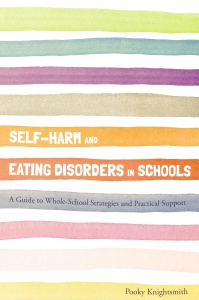Pooky Knightsmith is a specialist in student mental health and emotional well-being, and author of Self-Harm and Eating Disorders in Schools. Through her company In Our Hands Ltd, Pooky works with schools, parents and organisations to promote awareness of and provide training on topics related to mental health. She is also the Mental Health and Emotional Wellbeing Advisor for the PSHE Association in the UK and a trustee for Beat, the eating disorder charity. She has personal experiences of the issues she teaches and writes about, having personally overcome eating disorders and self-harm herself.
Here she shares her top tips for supporting young people suffering with self-harm and eating disorders, gathered through years of research and training.
“How on earth have you ended up doing what you do?” A colleague questioned me today “Teaching people about self-harm and eating disorders is not exactly the kind of job you dream about when you’re 14 is it?”
And he was right. I didn’t dream about doing my current job when I was 14. In fact, I didn’t dream about anything in my future when I was 14. All I really wanted was to be dead, but I lacked the motivation to make my ‘dream’ a reality. I was living a half-life, walking around each day in the shadows of anorexia and self-harm. So in answer to my colleague, I suppose that I started down the path I’m currently traversing in order to try and stop other children feeling the way I felt.
Fortunately, things have moved on somewhat from my own school days. We have a far better understanding of self-harm and eating disorders – unfortunately that’s at least in part due to a huge increase in prevalence in both conditions which has forced us to learn, fast, and taught us some difficult lessons along the way.
I feel we’re currently at the tipping point, with schools and agencies ready, willing and increasingly able to offer support to the young people who need it most. But what are the key lessons that we should bear in mind when offering support to young people in our care? If I had to boil down many years of research on the topic into three key learning points (and anyone who’s attended one of my training sessions will know how keen I am on having three take home points!) it would be these:
We need to enable young people to feel in control of their own recovery
A desire to take control of one aspect of their lives is a key reason young people cite for the development of self-harming and eating disordered behaviours. Bearing this in mind, we need to ensure that in our keenness to support young people’s recovery, that we don’t take this process straight out of their control. Contributing to their sense of lack of control is likely to exacerbate rather than alleviate their harmful behaviours. We can help young people to feel in control of their own recovery by employing truly person-centred practice where the young person is the key initiator in recovery goals and all information and meetings are designed to be accessible to the young person concerned.
We are stronger when we work as a team
When school staff, sufferers, parents and any external agencies involved come together and work as a team to support the recovery process with unified goals; progress is both more rapid and longer lasting. This type of team working can be difficult to implement but it reaps dividends in terms of positive impact for the young person trying to overcome their self-harming or eating disordered behaviours.
Recovery doesn’t stop when someone looks healed
Finally, we need to ensure that support doesn’t drop off the moment someone looks physically better. When a healthy weight has been restored or cuts or burns have healed then it’s normal for support to drop away. Tight health budgets often mean that therapeutic or psychiatric support may dwindle at this point and parents, friends and school staff can often begin to step away feeling that the worst is over. For the young person concerned though, this can be the most difficult phase of all as they are probably still working to overcome the underlying difficulties that drove them to their unhealthy behaviours, but they no longer have these behaviours to turn to as a means of coping. Whilst underlying issues are being resolved and new, healthy coping mechanisms are still being embedded, young people are very vulnerable to relapse. To minimise the likelihood of relapse, we need to ensure we extend our support, care and guidance into the weeks and months following physical recovery.
Things are looking up. More than ever I find myself welcomed with open arms when I go to teach colleagues about how best to support the young people in their care who are facing self-harm and eating disorders. A few short years ago there would have been no market for the book I’ve spent so long researching and writing and there would be no place for my training sessions; so taboo and under-recognised were these topics. We’re opening our eyes to the problem and our approaches are evolving fast. I’m hopeful that soon I’ll be able to reflect that a lot less young people are feeling like I did when I was 14.
I certainly hope so.
You can download one of Pooky’s PDF handouts, which gives alternatives to self-harm suggested by former self-harmers themselves, here
Find out more about Pooky’s book Self-Harm and Eating Disorders in Schools, read reviews or order your copy here